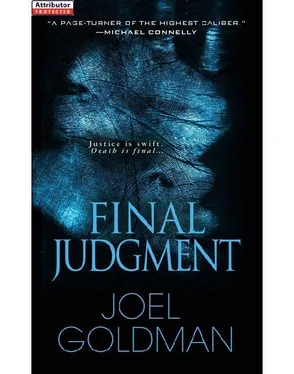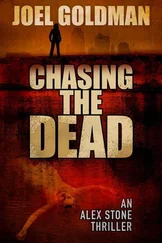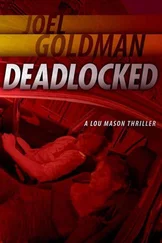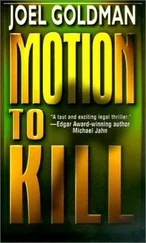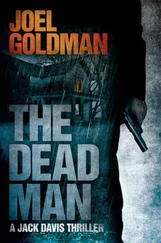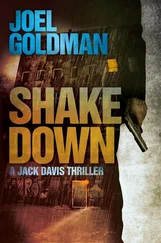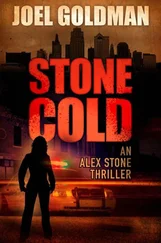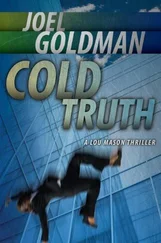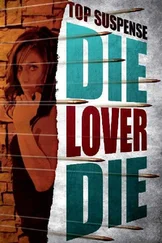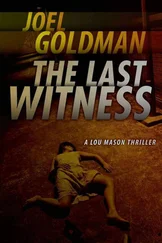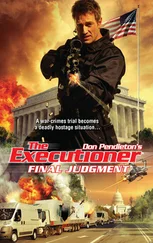Joel Goldman - Final judgment
Здесь есть возможность читать онлайн «Joel Goldman - Final judgment» весь текст электронной книги совершенно бесплатно (целиком полную версию без сокращений). В некоторых случаях можно слушать аудио, скачать через торрент в формате fb2 и присутствует краткое содержание. Жанр: Криминальный детектив, на английском языке. Описание произведения, (предисловие) а так же отзывы посетителей доступны на портале библиотеки ЛибКат.
- Название:Final judgment
- Автор:
- Жанр:
- Год:неизвестен
- ISBN:нет данных
- Рейтинг книги:3 / 5. Голосов: 1
-
Избранное:Добавить в избранное
- Отзывы:
-
Ваша оценка:
- 60
- 1
- 2
- 3
- 4
- 5
Final judgment: краткое содержание, описание и аннотация
Предлагаем к чтению аннотацию, описание, краткое содержание или предисловие (зависит от того, что написал сам автор книги «Final judgment»). Если вы не нашли необходимую информацию о книге — напишите в комментариях, мы постараемся отыскать её.
Final judgment — читать онлайн бесплатно полную книгу (весь текст) целиком
Ниже представлен текст книги, разбитый по страницам. Система сохранения места последней прочитанной страницы, позволяет с удобством читать онлайн бесплатно книгу «Final judgment», без необходимости каждый раз заново искать на чём Вы остановились. Поставьте закладку, и сможете в любой момент перейти на страницу, на которой закончили чтение.
Интервал:
Закладка:
Mason couldn’t let Fish answer the last series of questions without waiving the attorney-client privilege. The moment Mason instructed Fish not to answer, the impression Fish was leaving would be embossed in the cops’ minds. Yet Mason had no choice.
“Forget it,” Mason told the detectives. “You know better than to ask my client what he and I talked about. He told you what he knows. He found the body in the trunk this morning. His actions are understandable and not illegal.”
“The law says you’re supposed to report dead bodies, not hide them, Counselor,” Griswold said, ratcheting up the tempo for Mason.
“Within how many hours?” Mason asked. “He found the body after breakfast. It’s not even lunchtime. You want to charge him with failure to report, write it down. If you think you can prove that this fat old man killed whoever is in the trunk, then cut off the victim’s head and hands and drove around town with the leftovers, just say so. Otherwise, we’re leaving.”
Detective Griswold said, “We’ll have a warrant to search your client’s house in a couple of hours. Tell him not to go home and clean house before we get there.”
“You want to search my house?” Fish asked, standing and putting on his topcoat. “Be my guest. Search all you want. You don’t need a warrant. Just wipe your feet so you don’t track up. The last time the FBI searched my house, they left a mess. My housekeeper yelled at me for a week after that.”
Mason drove to Fish’s house. Fish rode with him, the detectives following behind. He had agreed with Fish’s offer of a voluntary search. It was another indication of Fish’s innocence. Or, from the cops’ perspective, it was proof that Fish committed the murder somewhere other than at his house. Either way, there was the risk that the cops would find something to incriminate Fish in the murder or in an unrelated offense.
“Don’t worry. My house is clean,” Fish said, reading Mason’s mind.
“A good housekeeper is hard to find,” Mason said.
Fish chuckled, a dry sound from deep in his throat. More regret than amusement. “I do have a good housekeeper and they are hard to find. But we both know that’s not what we’re talking about. I didn’t kill that man. I have no idea who he is or how he wound up in my trunk. It’s my bad mazel, my bad luck. That’s all. So don’t worry.”
Mason smiled. Fish had a way of comforting people, putting them at ease. He sprinkled Yiddish words into his conversations with Mason, a subtle reminder of their Jewish kinship, leaving the Yiddish out of his patter with gentiles.
Mason’s Jewish upbringing had been at the hands of his aunt, Claire Mason, who had raised him after his parents died in a car wreck when Mason was three. Claire had abandoned ritual and cultural Judaism, but faithfully practiced the commandment to heal the world with a law practice devoted to the underdog.
Avery Fish was the polar opposite of Mason’s aunt. He was devoted in his observance of ritual, attending daily services, keeping kosher and observing the Sabbath and the many holidays on the Jewish calendar. Yet he was a crook.
Mason had asked him about the obvious contradiction the first time they met. They were in Mason’s office, a one-room layout above a bar called Blues on Broadway in midtown Kansas City. Fish was candid about his guilt and worried about whether he would be able to keep kosher from a prison cell.
“I grew up in a very observant home,” Fish explained. “I studied Torah with my father every Shabbos. I learned to chant all the prayers and the different melodies of the service. The rituals became my rituals. It never occurred to me not to be an observant Jew.”
“That part I understand,” Mason said. “What I don’t understand is the government’s indictment of you for mail fraud and the arrest-dodging track record you’ve compiled when you’re not praying.”
Fish shrugged his shoulders, his chin disappearing into the folds of his neck. “It’s not a perfect world and I’m not a perfect man. But I know who and what I am. God knows too. One day, He and I will settle up.”
Mason shook his head, uncertain whether Fish was being honest about his imperfections or merely hypocritical about his faith. Mason’s own life was not without contradictions. He defended people accused of crimes, yet had sometimes crossed the line in their defense, leaving others dead or ruined. But his clients had been vindicated, the guilty caught. Who was he to judge Avery Fish? What would he do when it was his turn to settle up?
SIX
Mason pulled up in front of Fish’s house. There were two police cars in the driveway and two more parked on the street. A contingent of cops waited at the front door. Neighbors watched from their windows, a few braving the cold for a better view from their front yards.
Fish quickly took in the scene, groaning as he got out of the car. “ Oy, the tsoris I’ve got!”
The detectives, uniformed cops, and forensics crew spent four hours combing through Fish’s house. They moved every piece of furniture, rolled up every rug, opened every cabinet, drawer, and closet. They unscrewed air-conditioning vents, poked their heads and shoulders into ventilation shafts, and swept the concrete basement floor for any sign of freshly poured cement. They rattled the radiators, jimmied the floorboards for loose panels, and crawled through the attic. They raked the dead leaves that had piled hard against the house and they wormed through the boxes, old clothes, and other leftovers crammed to the ceiling in the garage.
Griswold and Cates took turns glaring at Fish, who sat at the kitchen table reading a book whose cover promised that a short history of nearly everything lay within its pages, oblivious to the whirlwind around him. Mason had neither Fish’s patience nor his attention span and followed in the wake of the searchers, taking a silent delight in their growing frustration.
By mid-afternoon, the party was breaking up. The cops had bagged hairs, fibers, and threads so they wouldn’t go home empty handed, but they hadn’t carried out a head or hands packed in ice or buried in dirt. They hadn’t found any bloodied butcher knives or surgical instruments with bits of flesh and blood clinging to the sharp edges.
The search had been a bust, and Mason read the results in Griswold’s slumped shoulders and Cates’s pursed lips as he dragged on a cigarette, the two of them huddled at the curb next to their unmarked Crown Victoria.
Mason knew that it was a mistake to treat the detectives as interchangeable parts. Though they were partners and were cut from the same physical mold, there had to be differences between them, and Mason needed to know what they were beyond which one would play the good cop and which one the bad cop. Did one of them have a chip on his shoulder? Was one of them too lazy to dig out the facts? Could he trust either of them?
He hadn’t seen enough of them to know the answers to these questions. Griswold had given him a business card. His first name was Kevin. Cates hadn’t offered one, though Mason overheard someone use his first name-Tom. Griswold wanted to make an impression. Cates didn’t care. It wasn’t much, but it was something.
“All in and all done?” Mason asked them, the air frosting his breath.
“Yeah,” Griswold said.
“For now,” Cates added, the red tip of his smoke weaker than the threat he was trying to make.
“Don’t be so disappointed. There are lots of other places to look for the killer.”
“Maybe,” Griswold said. “But I’m still thinking this is a pretty good place.”
“Come back any time. We’re always open. Just call ahead and bring a warrant next time. Only the first search is free.”
Читать дальшеИнтервал:
Закладка:
Похожие книги на «Final judgment»
Представляем Вашему вниманию похожие книги на «Final judgment» списком для выбора. Мы отобрали схожую по названию и смыслу литературу в надежде предоставить читателям больше вариантов отыскать новые, интересные, ещё непрочитанные произведения.
Обсуждение, отзывы о книге «Final judgment» и просто собственные мнения читателей. Оставьте ваши комментарии, напишите, что Вы думаете о произведении, его смысле или главных героях. Укажите что конкретно понравилось, а что нет, и почему Вы так считаете.
